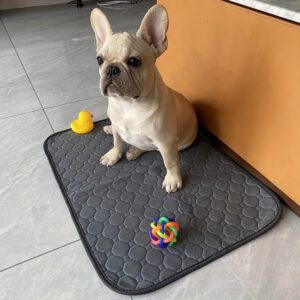Do you ever look at your adorable new puppy and wonder how to successfully house-train this little furball? I have, and let me tell you, it lingers in the minds of even the most experienced pet owners. House-training a puppy can sometimes feel like an uphill battle, with the odds stacked against you. Rest assured! Approaching the task with patience, consistency, and humor can make it much more manageable.
Why House Training Matters
The Importance of a Routine
Similar to humans, puppies flourish with a consistent routine.
In its absence, disorder takes hold, encompassing more than just the destruction of shoes and furniture.
I soon realized that lack of consistency not only confuses puppies but also prolongs the challenges of house training.
Establishing a consistent routine for feeding, playtime, and bathroom breaks is crucial for maintaining your sanity.
Minimizing Stress—for Both of You
Understanding Your Puppy's Signals
Observing Behavior
Are you curious about how to determine when your puppy needs to go outside? From my experience, the key lies in careful observation.
When a puppy begins to explore with an intensity that rivals a truffle pig, diligently circling an area as if preparing to set up miniature traffic cones, or displaying a contemplative gaze as if pondering the mysteries of the universe—these behaviors are all indications that nature is beckoning.
Decoding the Whine and Pace
At times, it can be even more nuanced. There is a slight whine in the background, accompanied by restless pacing. It's important to remember that each puppy has its own unique characteristics. For example, my cat sat by the door, fixating on it as if it held a mysterious secret.
Setting Up a Designated Potty Area
Indoor vs. Outdoor
Consider the option that best suits your living situation: indoor pads or heading outside. If you're outdoors, it's best to stay in one location. Consistent pad placement is crucial for effective indoor training.
It can be challenging for puppies to navigate their surroundings and remember changes in their environment, such as moving a pad from the kitchen to the living room. They rely on your guidance to help them adapt.
Pros and Cons Table
| Option | Pros | Cons |
|---|---|---|
| Outdoor | Fresh air is better for long-term | Weather dependent, more challenging at night |
| Indoor | Convenient, suitable for apartments | It can be confusing for the pup later |
Creating a Positive Association
The goal is to transform this designated potty area into an exciting and enjoyable space for your furry friend. Imagine a heavenly treat.
When they successfully relieve themselves in the correct spot, give them plenty of praise and the occasional treat as a reward. Imagine this as unveiling a luxurious experience fit for canines—puppies adore it.
Tools You'll Need
Leash and Collar
Investing in a high-quality leash and a well-fitting collar will significantly enhance your pet's comfort and safety. These items are more than just accessories; they are essential for survival. With the leash, you can keep your puppy safely contained in the designated area, while the collar helps you manage their energetic pre-potty movements.
 Puppy Pads and Cleaning Supplies
Puppy Pads and Cleaning Supplies
Puppy pads are essential for effective indoor training. Consider them your furry friend's designated potty pads.
Remember to replenish your cleaning supplies. Mistakes are bound to occur, and timing is inevitable. Embrace them as a natural part of the process and continue forward.
Treats for Positive Reinforcement
Your puppy's training centers on the irresistible treats that bring them pure joy. Using rewards as positive reinforcement can be highly effective in creating a positive connection between your pet and the desired behavior of using the designated area for their needs.
However, it is important to exercise caution when overfeeding and to avoid any future issues when introducing your puppy to a treadmill.
Establishing a Schedule
Morning Routine
First things first: start your day by taking a bathroom break. Prioritize taking your puppy to their designated spot before indulging in your morning coffee.
Taking advantage of puppies' waking-up opportunity is essential, as they often need to go outside immediately.
Mealtime and Post-Meal Breaks
Puppies typically need to go potty after meals. The optimal time for maximum effectiveness is typically 10-20 minutes after feeding. This window serves as your prompt to guide them to the designated toilet area.
Incorporate this practice into your routine after every meal and witness the transformative power of conditioning.
Bedtime Routine
Lastly, make sure your puppy relieves itself before going to sleep. This minimizes the chances of waking up at 3 a.m. by a restless and whiny dog who urgently needs to go outside. It saves you from enduring those dark, cold nights of unexpected mishaps.
Handling Accidents Calmly
Immediate Clean-Up
Mishaps are bound to occur, and they're common during the early stages of owning a puppy. Please tidy up right away. Use enzymatic cleaners that eliminate urine odor, preventing your puppy from being drawn back to the same spot as a biological homing device.
Avoiding Punishment
Using a harsh or stern tone can easily cause your puppy to become fearful and uncertain about house training. Remain composed. Instead, concentrate on strengthening desired behaviors through positive reinforcement and rewards.
After all, who wants to be criticized whenever they make a mistake while learning something new?
Gradually Increasing Independence
Lengthening Time Between Breaks
As your puppy becomes more accustomed to the routine, you can gradually extend the intervals between potty breaks. It's akin to progressively granting them more freedom, testing their ability to handle it.
Monitoring Progress
Stay organized and monitor your puppy's development by using a convenient chart or keeping notes on your phone. Note the duration between breaks and any incidents, and make necessary adjustments to your schedule. Consistency is of the utmost importance in this context.
Progress Monitoring Table
| Day | Accidents | Time Between Breaks | Notes |
|---|---|---|---|
| Day 1 | 2 | 30 minutes | Getting used to the pads |
| Day 7 | 1 | 1 hour | Improved signaling |
| Day 14 | 0 | 1.5 hours | Consistent success |
What to Do for Stubborn Puppies
Re-evaluating Your Method
There's no need to worry if things aren't going according to your expectations. Perhaps it is worth considering a fresh approach.
Maybe the location isn't perfect, or you're not picking up on their subtle hints. Modifications may be required, and that's completely acceptable.
Seeking Professional Help
When everything else seems to go wrong, experienced trainers can be a true savior. They possess expertise, a calm demeanor, and invaluable insights that would never have crossed your mind.
Frequently, a single consultation can provide a significant breakthrough.
Building a Stronger Bond
The Rewards Beyond House Training
House training goes beyond simply teaching your puppy where to relieve themselves; it involves fostering trust and developing a mutual understanding. This process cultivates a deep connection that goes beyond mere practicalities. It offers valuable insights into patience, empathy, and mutual respect.
Celebrating Milestones Together
Every achievement is a collective triumph. Embrace and appreciate every achievement, no matter how small or significant. Rewards, compliments, a fresh plaything—anything that brings joy to your beloved pet. These milestones form the foundation of your bond with your furry companion.
Final Thoughts
Training a puppy to use the toilet indoors may initially appear daunting, but it is entirely possible with patience, consistency, and a bit of understanding of canine behaviour.
Mastering the intricate art of cues, rewards, and routines is a fulfilling adventure for you and your furry companion. As I sit here, observing my well-behaved pup peacefully falling asleep, I can't help but savor each little victory we accomplished together.
By implementing a carefully crafted strategy and displaying unwavering determination, you can transform house training your puppy from a daunting task into a rewarding experience that fosters a strong bond.
Your Training Guide at a Glance
| Step | Key Actions |
|---|---|
| Understanding Signals | Observe and interpret behavior cues |
| Setting up Potty Area | Choose indoor vs. outdoor, create positivity |
| Gathering Tools | Leash, pads, cleaning supplies, treats |
| Establishing Schedule | Morning, post-meal, bedtime routines |
| Handling Accidents | Clean immediately, no punishment |
| Increasing Independence | Lengthen breaks, monitor progress |
| Dealing With Challenges | Adjust methods, seek professional help |
| Building Bond | Celebrate achievements, enjoy the journey |
So here it is: my journey unraveled and pieced together for the next hopeful pet owner. May it guide you and your new companion toward a clean, happy household and many cherished moments.
The Article: How To House Train A Puppy Was Found On https://happypetsgroomingtable.com/
The Article: How To House Train A Puppy Was Found On https://ai.ezi.gold
The Article How To House Train A Puppy Was Found On https://limitsofstrategy.com
The Article How To House Train A Puppy First Appeared ON
: https://ad4sc.com



 Puppy Pads and Cleaning Supplies
Puppy Pads and Cleaning Supplies






Comments are closed